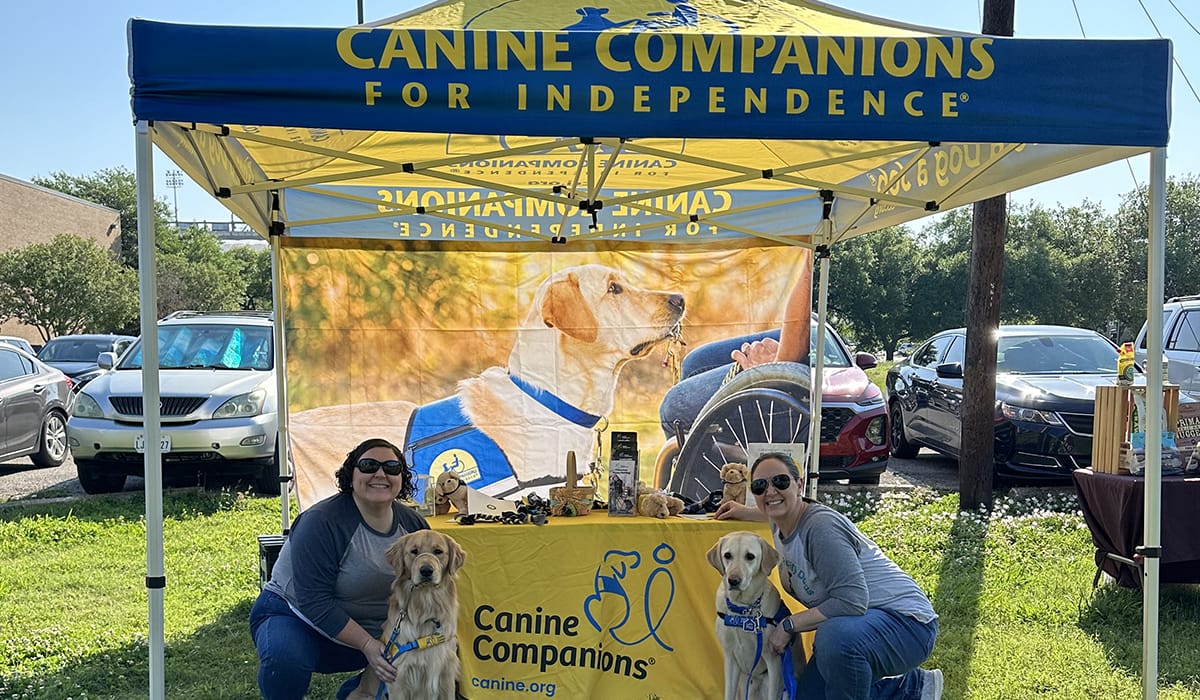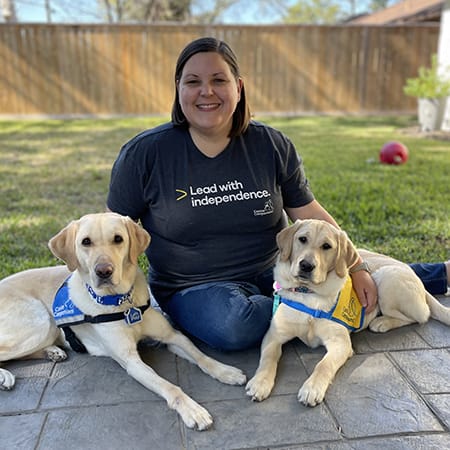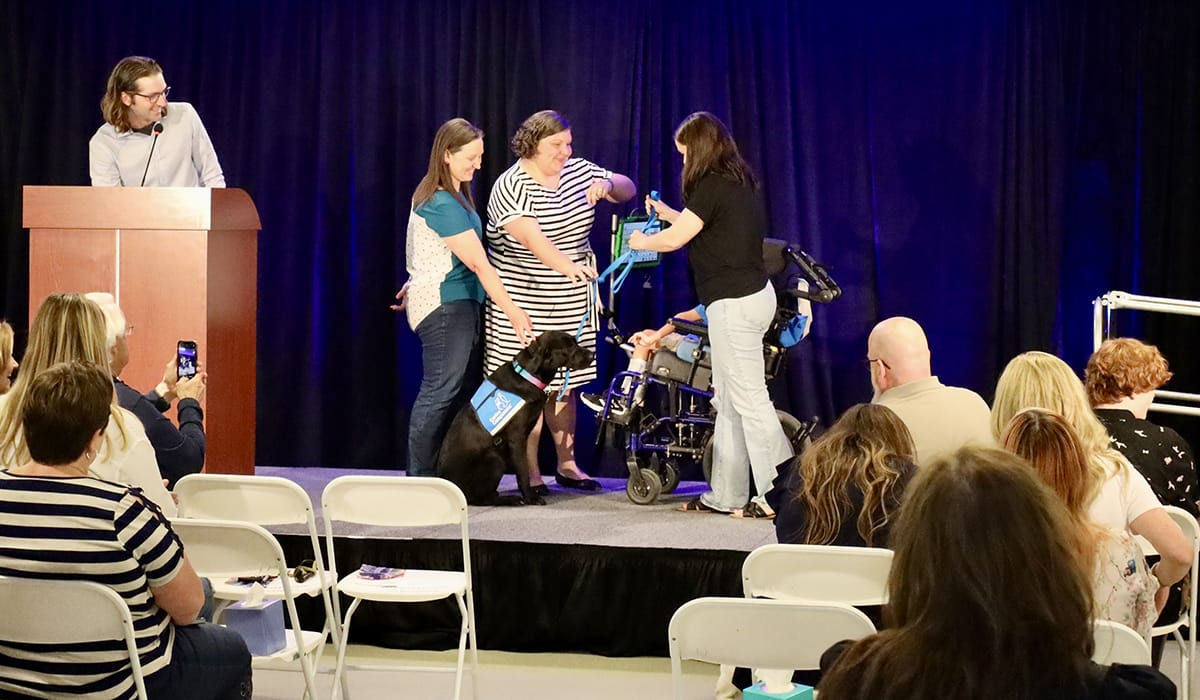Behind Every Service Dog

Meet Daily Point of Light Award honoree Samantha Martinez. Read her story, and nominate an outstanding volunteer or family as a Daily Point of Light.
Most people are aware of what service dogs can do, but few see the training behind each furry face and the team of dedicated volunteers whose hard work makes it happen. Samantha Martinez, or “Sam”, is one such volunteer. Sam was Head of Programs for a national nonprofit for 15 years before landing with a research and design company that builds products for kids in the hospital and to impact patient experience across the country. Put simply, she and her colleagues promote a calming environment during stressful medical experiences.
Service dogs are a part of nearly every aspect of Sam’s life from working with hospitals to the four-legged family member matched to her wife for her own work. Sam decided to get involved with the organization that brought Dexter into their lives, and today, she is the president and a puppy raiser with her local chapter of Canine Companions, a group that trains and provides service dogs to people with disabilities or professionals in need of a facility dog at no cost.
When she’s not working, Sam maintains a full house of three cats and two dogs—Dexter and a ten-year-old rescue with strong personal space boundaries—along with the puppy they’re raising and the occasional friends-in-training who need a babysitter.

What inspired you to get started with this initiative?
My wife Christy, a child life specialist, built the facility dog program at the Children’s Memorial Hermann hospital here in Houston. She was matched with Dexter in 2019. She uses him for physical and occupational therapy. It’s more fun to get up after surgery when Dexter’s at your door wanting to go on a walk. Occupational therapy patients can brush him and play fetch, which is great for motor skills.
After we got Dexter, we learned about his puppy raisers and the organization as a whole, and wanted to give back. I started volunteering with the chapter and became the president shortly after.
Tell us about your volunteer role with Canine Companions.
As the president of the chapter, one of my main tasks is supporting our various communities. Houston is a large area, and our graduate team families and people with dogs in training used to not know one another. When I came in as a president, I wanted to build those relationships so it didn’t feel like they were on an island. Grads are grateful for these puppy raisers who have put so much into these dogs who are changing their lives. And puppy raisers are doing this because they’re amazing, and they don’t get to see their hard work come to life.
I also do a lot of recruiting, awareness building, fundraising and community events. It’s always busy, but my favorite things to do are playdates. We invite both puppies and graduate teams over, and the dogs take their vests off and run around with one another while the humans connect. Their playful sides come out when they spend time with their friends.
We became involved in the puppy raising program in 2021. Our experience is unique in the sense that we co-raise with a federal women’s correctional facility in Bryan. We’re called starters and finishers. Puppies are with us from eight to 12 weeks old, raised by an inmate until they are 10 to 12 months old, then stay with us until they matriculate at about 18 months.
Tell us more the program with people who are incarcerated.
We drop dogs off after they learn the basics—like potty and kennel training–with their inmate handler. As the dogs’ primary handler, they have kennels in their space, and there are rooms for training and grooming. They’ve got a yard for the dogs to run and play. They do classes and work together to teach the dogs the 40+ commands that they will need to graduate.
Inmates apply and are selected to be part of the program. They go through rigorous training with our puppy program manager and have check-ins. One of our volunteers does training classes twice a month. I do that at the Beaumont Men’s prison. Part of my work as the chapter president is helping these inmates be successful and guiding them along the way.
For inmates, it’s an honor and a privilege incentivizing good behavior, and it helps build life skills that they may not have learned, like taking care of someone. Meanwhile, pups show them unconditional love. The recidivism rate for inmates in prison programs is practically zero. It’s helping keep inmates out of prison, and it’s helping puppies graduate as service dogs. Graduation rate for their dogs is around 85%. Most everywhere else, it’s only about 50%.
As finishers, we bring them back out for socialization that becomes more challenging inside the prison. They blossom as they discover all the things the outside world has to offer.

Are there any upcoming events that you’re excited about?
We’re about to have our first Dogfest on October 5. We’ve been fundraising, recruiting and getting that off the ground. I hope to grow it each year as a staple event for volunteers to get involved with and for people to learn about us.
What’s been the most rewarding part of your work?
It’s seeing that eight-week-old puppy who didn’t sleep through the night and didn’t know where to go to the bathroom turn into this confident 18-month-old dog that I’m walking across the stage as commencement music plays. They know all their skills, and they’ve come so far. When your dog graduates as a service dog, you get to hand the leash to the new family. It’s a beautiful day and bittersweet to say goodbye, but I know that they’re built for bigger and better things.
Why is it important for others to get involved with causes they care about?
I look at it as a privilege. We, as people, are what will make change in this world. Find whatever you’re passionate about and get involved, because it will fill your cup and give you drive in ways you didn’t know existed. I had no idea puppy raising would bring so much joy to my life. I’ve made incredible lifelong friends from it, and all of these dogs have a piece of my heart. It’s made me a better human.
Do you want to make a difference in your community like Samantha? Find local volunteer opportunities.
